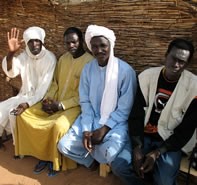Mararit in Chad

Photo Source:
Frontiers
|
Send Joshua Project a map of this people group.
|
| People Name: | Mararit |
| Country: | Chad |
| 10/40 Window: | Yes |
| Population: | 60,000 |
| World Population: | 103,000 |
| Primary Language: | Mararit |
| Primary Religion: | Islam |
| Christian Adherents: | 0.03 % |
| Evangelicals: | 0.01 % |
| Scripture: | Translation Started |
| Ministry Resources: | No |
| Jesus Film: | No |
| Audio Recordings: | Yes |
| People Cluster: | Ouaddai-Fur |
| Affinity Bloc: | Sub-Saharan Peoples |
| Progress Level: |
|
Introduction / History
Chad became independent from France in 1960. Unfortunately, since that date Chad has experienced a series of civil wars, the assassinations and arrests of political leaders, coups and wars with Libya and Sudan. A quarter of Chad's income is aid from the UN, NGOs, France, China and the USA. International agencies consider Chad to be a failed state. Less than 40% of the people are able to read and write. Life expectancy is under 50 years. In 2003 Chad became an oil exporting nation. Most of the revenue from the oil went to buying weapons and for the salaries of the Chadian military, not for the welfare of the Chadian people. There are few if any no known believers among the Mararit people. Thousands of people have fled western Sudan and now live as refugees in the region of Chad where the Mararit live. The Mararit and the Ab Sharib are two subgroups of the larger Tama peoples in Chad. They call themselves the "Ibilak." Mararit and Abu Sharib speak the same language of Mararit. Most of Marait live in the east central Chad, north-east of the major market town of Abeche. The Ab Sharib branch of the Mararit people group moved northwards some time ago, into a more mountainous area.
What Are Their Lives Like?
The Mararit benefit from living in an area with plentiful water supply. The gardens around the rivers can be cultivated all year round and they don't have to move their herds around to find water as many other groups in northern and central Chad. Agriculture lies at the heart of the life in Ibilak villages. Millet is their stable crop. They grow cotton and peanuts are cash crops. Living in an area with good water supplies they can subsist well, sustaining a traditional lifestyle in ways passed down from their ancestors. In recent decades there were large numbers of Mararit who went elsewhere for work when there were years with famine conditions. These days many of the men travel to other places, such as Ndjamena, the capital and largest city of Chad. With extra resources in hand many have returned and many plan to return and resume their livelihood in their villages in the Ouaddai Province.
What Are Their Beliefs?
Around the time the rainy season, Mararit make sacrifices before they sow millet seeds. They ask for the spirits for the blessing of enough rain and a good harvest. These sacrifices probably go back to practices of pre-Islamic traditions, but today all the Marait profess to be Sunnis Muslims. Their brand of Islam is heavily influenced by folk religion and animism.
What Are Their Needs?
The Mararit need to understand that Isa, Jesus, is much more than human prophet. The Mararit would benefit by teams of medical workers coming to them. They also need schools for their children. Christian teachers could help meet that need. The Abu Mararit must see the love of Christ demonstrated to them in practical ways.
Prayer Points
Pray that Mararit parents are able to provide for their children. Pray that the Lord sends workers to engage the Mararit with the gospel. Pray that the Bible and Christian resources are translated into the Mararit language. Ask the Lord is to raise up a church planting movement among the Mararit in this decade.